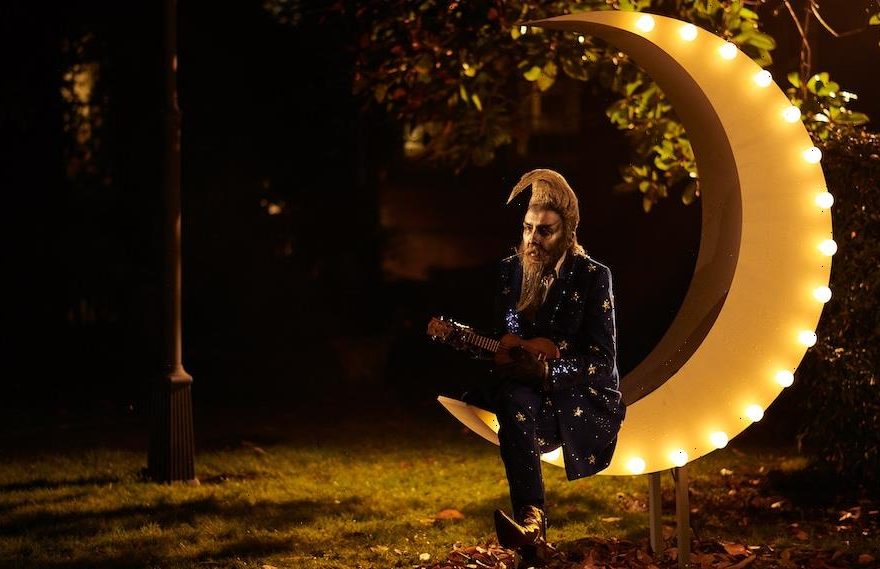Though famously ambivalent about film adaptations of his work — to the degree of never watching some — Alan Moore has written a screen original in “The Show,” perhaps attracted to a more hands-on approach to the medium now that he’s officially retired from comics. This playfully wayward mystery set in his native Northampton turns that burg into a kind of midlands Gotham, where not-quite-superheroic intrigue unfolds as convolutedly as possible. Fun if perhaps a little too tongue-in-cheek for its own good, the results will no doubt appeal most to Moore fans who’ll revel in his Byzantine plotting, noirish tropes and other signature elements. Fathom Events is providing them one-night U.S. theatrical access this Thursday, Aug. 26; release in other formats is as yet unannounced.
“The Show” is directed by Mitch Jenkins, a photographer who’s collaborated with the “Watchmen” scribe for 12 years, including on several shorts that introduced some of its characters and ideas. (Three were previously packaged as the little-seen 2014 omnibus feature “Show Pieces.”) Though meant to be self-contained, the film does give off a sly in-joke air that may feel too insular for some, as if its primary world-building had already happened somewhere else. On the other hand, it’s hardly as if there’s a lack of viewers who’ll grasp exactly what Moore is up to here, in general if not always in playfully cryptic narrative specifics.
Fletcher Dennis (Tom Burke, last seen by audiences as Orson Welles in “Mank”) is a floppy-haired loner traveling incognito on the behest of a London client who wants back a stolen family heirloom. But upon tracing his suspect to Northampton, the hitman/private dick currently going as “Steve” discovers that Jim Mitchum (Darrell D’Silva) died in an apparent nightclub mishap the night before. Still being paid to find the missing “golden cross,” he checks into a B&B and chases various leads.
Those in turn acquaint him with a roll call of oddballs including a librarian with an apparent secret masked identity (Richard Dillane), a band frontman who styles himself after Hitler (Eric Lampaert), an imperious drug queenpin (Sheila Atim), a hostile yet hyper-observant witness (Antonia Campbell-Hughes) and so forth. But then everyone hereabouts is a trifle odd, not excluding our protagonist’s parapsychology-studying hostess (Ellie Bamber), or the local detective agency he discovers is run by children in fedoras, speaking hardboiled 1940s pulp prose.
As if these encounters aren’t dislocating enough, there are frequent abrupt sidesteps into flashbacks, dream sequences and hallucinations. The blurriness of reality is underlined by what a cabbie tells Fletcher the deceased thief told him: That everyone is living in a “series of linked games … a simulation inside a simulation inside a simulation.” Adding his own two cents, the cabbie quotes an old adage, “God made the country, but he didn’t make the town.” Moore himself (made up like a crescent moon) appears as a figure who might be classified as God’s traditional nemesis, though the most conspicuously evil personality here turns out to be our hero’s own employer (Christopher Fairbank as Mr. Bleaker). Fletcher’s only real ally is Faith (Siobhan Hewlett), a journalist who was present when Mitchum died, and who amidst that night’s very confusedly-recalled events nearly died herself.
More than a bit “Twin Peaks-y” in its surreal flourishes, labyrinthine structure and droll-to-broad humor, albeit with a lighter heart of darkness, “The Show” throws everything from the occasional song or TV spoof to a Fellini-esque farcical court trial. Despite a few big chunks of explicative monologue, there’s not much getting-to-the-bottom-of-all-this — or sense that if you could sort it out, it would matter much. This enterprise runs more on idiosyncrasy than action or plot, though it never feels static in editor Colin Goudie’s sleek pacing.
It’s all diverting, with the actors striking assertive notes on a continuum from bemused earnestness to vaudevillian caricature. While the film’s overall look is familiar comic-book noir, DP Simon Tindall, production designer Helen Watson, Hilary Hughes’ costumes and other design personnel’s contributions provide attractive splashes of splashes of vivid color. “The Show” ultimately seems just to be toying with its major fixations, from Northampton itself to underworlds both criminal and occult. It hesitates to really say anything about them, or indeed go anywhere very concrete at all—but it will entertain those for whom watching Alan Moore play around with such themes is inherently rewarding enough.
Source: Read Full Article
